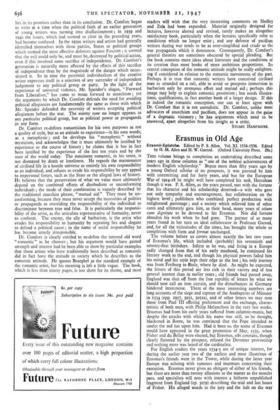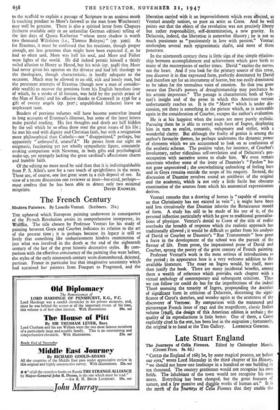Erasmus in Old Age
ErasmisEpistolaa. Edited by P. S. Allen. Vol. XI. 1534-1536. Edited by H. M. Men and H. W. Garrod. (Oxford University Press. 28s.) THIS volume brings to completion an undertaking described some years ago in these columns as "one of the noblest achievements of modern English scholarship." Begun more than fifty years ago by a young Oxford scholar of no prospects, it was pursued by him with unremitting zeal for forty years, and but for the European War of 1914-18 he might well have completed his task, Herculean though it was. P. S. Allen, as the years passed, met with the fortune that his character and his scholarship deserved—a wife who gave not only sympathy and encouragement, but collaboration on the highest level ; publishers who combined perfect production with enlightened patronage ; and a society which relieved him of other cares and ultimately gave him, as their head, many years of otium cum dignitate to be devoted to his Erasmus. Nor did fortune abandon his work when he had gone. The partner of so many years found in her turn an ideal collaborator in Professor Garrod, and, for all the vicissitudes of the times, has brought the whole to completion with form and format unchanged.
The volume before us covers almost exactly the last two years of Erasmus's life, which included (probably) his seventieth and seventy-first birthdays. Infirm as he was, and living in a Europe sadly changed from that of his early manhood, he continued his literary work to the end, and though his physical powers failed him his mind and his style kept their edge to the last ; his only journey was from Freiburg to Basle, where he died. As might be expected, the letters of this period are less rich in their variety and of less general interest than in earlier years ; old friends had passed away, England was shut off from the free republic of letters by what we should now call an iron curtain, and the disturbances in Germany hindered intercourse. Three of the most interesting numbers are long accounts of the siege and capture of the Anabaptists of Munster in 1534 (ePP. 2957, 3031, 3031a), and of other letters we may note those from Paul III offering preferment and the exchange, charac- teristic of both men, with Philip Melancthon in the very last weeks. Erasmus had from his early years suffered from calumny-mania, but despite the attacks with which his name was still, so he thought, blackened in Rome, he was convinced that the Pope intended to confer the red hat upon him. Had it been so, the name of Erasmus would have appeared in the great promotion of May, 1535, when Fisher and du Bellay were elected, but Erasmus, sibi constans, though clearly flattered by the prospect, refused the Deventer provostship and nothing more was heard of the cardinalate.
For English readers the years 1534-5 are of unique interest, for during the earlier year two of the earliest and most illustrious of Erasmus's friends were in the Tower, while during the latter year Europe was echoing with rumours and murmurs concerning their execution. Erasmus never gives an obitgary of either of his friends, but there are more than twenty allusions to the matter as the months pass, and specialists will note with interest a hitherto unpublished fragment from England (ep. 3079) describing the trial and last hours of Fisher. His alleged words to the jury and the halt on the way to the scaffold to explain a passage of Scripture to an anxious monk (a touching pendant to More's farewell to the man from Winchester) may well be genuine. There is also a spirited letter from Chapuys (hitherto available only in an unfamiliar German edition) telling of the last days of Queen Katherine " whose mere shadow is worth two thousand Wiltshires (i.e., Thomas Boleyns)" (ep. 3090). As for Erasmus, it must be confessed that his reactions, though proper enough, are less generous than might have been expected if, as he had so often said, More was half his soul, and More and Fisher were lights of the world. He did indeed permit himself a thinly veiled allusion to Henry as Herod, but his wish (ep. 3048) that More had never given his opinion on the divorce and had left theology to the theologians, though characteristic, is hardly adequate to the occasion. Much may be allowed to an old, sick and lonely man, but the persistent attempts of Erasmus (though now a man of consider- able wealth) to recover the pensions from his English benefices (one of which, by a stroke of ill fortune, was held by the parish priest of the Nun of Kent) and his effusive thanks to Cromwell in 1536 for a gift of twenty angels (ep. 3107 ; unpublished hitherto) leave an unpleasant taste.
Readers of previous volumes will have become somewhat inured to long accounts of Erasmus's illnesses, but some of the latest letters make painful reading. His last thoughts and death are half hidden by the veil which he so often drew over the great issues of his life ; he met his end with dignity and Christian faith, but with a resignation more philosophical than Catholic—not " disappointed," perhaps, but apparently " unhousel'd, unanel'd." He passes from our sight an enigmatic, fascinating yet not wholly sympathetic figure, constantly evoking comparison with Newman, in both gifts and psychological make-up, yet strangely lacking the great cardinal's affectionate charm and humble faith.
Of the editing no more need be said than that it is indistinguishable from P. S. Allen's save for a rare touch of sprightliness in the notes. These are, of course, one last great seam in a rich deposit of ore. In view of a recent discussion one reviewer at least—bat-eyed, perhaps— must confess that he has been able to detect only two minimal



































 Previous page
Previous page